6 start with N start with N
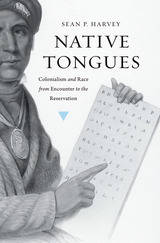
Sean Harvey explores the morally entangled territory of language and race in this intellectual history of encounters between whites and Native Americans in the eighteenth and nineteenth centuries. Misunderstandings about the differences between European and indigenous American languages strongly influenced whites’ beliefs about the descent and capabilities of Native Americans, he shows. These beliefs would play an important role in the subjugation of Native peoples as the United States pursued its “manifest destiny” of westward expansion.
Over time, the attempts of whites to communicate with Indians gave rise to theories linking language and race. Scholars maintained that language was a key marker of racial ancestry, inspiring conjectures about the structure of Native American vocal organs and the grammatical organization and inheritability of their languages. A racially inflected discourse of “savage languages” entered the American mainstream and shaped attitudes toward Native Americans, fatefully so when it came to questions of Indian sovereignty and justifications of their forcible removal and confinement to reservations.
By the mid-nineteenth century, scientific efforts were under way to record the sounds and translate the concepts of Native American languages and to classify them into families. New discoveries by ethnologists and philologists revealed a degree of cultural divergence among speakers of related languages that was incompatible with prevailing notions of race. It became clear that language and race were not essentially connected. Yet theories of a linguistically shaped “Indian mind” continued to inform the U.S. government’s efforts to extinguish Native languages for years to come.
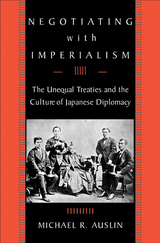
Japan's modern international history began in 1858 with the signing of the "unequal" commercial treaty with the United States. Over the next fifteen years, Japanese diplomacy was reshaped to respond to the Western imperialist challenge. Negotiating with Imperialism is the first book to explain the emergence of modern Japan through this early period of treaty relations.
Michael Auslin dispels the myth that the Tokugawa bakufu was diplomatically incompetent. Refusing to surrender to the West's power, bakufu diplomats employed negotiation as a weapon to defend Japan's interests. Tracing various visions of Japan's international identity, Auslin examines the evolution of the culture of Japanese diplomacy. Further, he demonstrates the limits of nineteenth-century imperialist power by examining the responses of British, French, and American diplomats. After replacing the Tokugawa in 1868, Meiji leaders initially utilized bakufu tactics. However, their 1872 failure to revise the treaties led them to focus on domestic reform as a way of maintaining independence and gaining equality with the West.
In a compelling analysis of the interplay among assassinations, Western bombardment of Japanese cities, fertile cultural exchange, and intellectual discovery, Auslin offers a persuasive reading of the birth of modern Japan and its struggle to determine its future relations with the world.

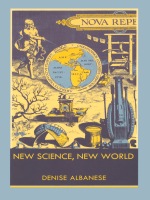
Albanese reads the inaugurators of the scientific revolution against the canonical authors of early modern literature, discussing Galileo’s Dialogue on the Two Chief World Systems and Bacon’s New Atlantis as well as Milton’s Paradise Lost and Shakespeare’s The Tempest. She examines how the newness or “novelty” of investigating nature is expressed through representations of the New World, including the native, the feminine, the body, and the heavens. “New” is therefore shown to be a double sign, referring both to the excitement associated with a knowledge oriented away from past practices, and to the oppression and domination typical of the colonialist enterprise. Exploring the connections between the New World and the New Science, and the simultaneously emerging patterns of thought and forms of writing characteristic of modernity, Albanese insists that science is at its inception a form of power-knowledge, and that the modern and postmodern division of “Two Cultures,” the literary and the scientific, has its antecedents in the early modern world.
New Science, New World makes an important contribution to feminist, new historicist, and cultural materialist debates about the extent to which the culture of seventeenth-century England is proto-modern. It will offer scholars and students from a wide range of fields a new critical model for historical practice.
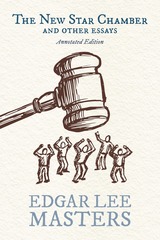
Coedited by noted Masters scholar, Jason Stacy, and his class, “Editing History,” this annotated edition of Edgar Lee Masters’s The New Star Chamber and Other Essays reappears at a perilous time in US history, when large corporations and overseas conflicts once again threaten the integrity of American rights and liberties, and the United States still finds itself beholden to corporate power and the legacy of imperial hubris. In speaking to his times, Masters also speaks to ours.
These thirteen essays lay bare the political ideology that informed Spoon River Anthology. Masters argues that the dangerous imperialism championed by then-President Theodore Roosevelt was rooted in the Constitution itself. By debating the ethics of the Philippine-American War, criticizing Hamiltonian centralization of government, and extolling the virtues of Jeffersonian individualism, Masters elucidates the ways in which America had strayed from its constitutional morals and from democracy itself. The result is a compelling critique of corporate capitalism and burgeoning American imperialism, as well as an exemplary source for understanding its complicated author in the midst of his transformation from urban lawyer to poet of rural America.
In print again for the first time since 1904, this edition includes an introduction and historical annotations throughout. Edited and annotated by students at Southern Illinois University Edwardsville, and designed and illustrated by students at Southern Illinois University Carbondale, this volume traces economic and political pathologies to the origins of the American republic. The New Star Chamber and Other Essays is as vital now as it was over 100 years ago.
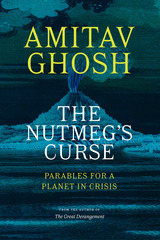
A powerful work of history, essay, testimony, and polemic, Amitav Ghosh’s new book traces our contemporary planetary crisis back to the discovery of the New World and the sea route to the Indian Ocean. The Nutmeg’s Curse argues that the dynamics of climate change today are rooted in a centuries-old geopolitical order constructed by Western colonialism. At the center of Ghosh’s narrative is the now-ubiquitous spice nutmeg. The history of the nutmeg is one of conquest and exploitation—of both human life and the natural environment. In Ghosh’s hands, the story of the nutmeg becomes a parable for our environmental crisis, revealing the ways human history has always been entangled with earthly materials such as spices, tea, sugarcane, opium, and fossil fuels. Our crisis, he shows, is ultimately the result of a mechanistic view of the earth, where nature exists only as a resource for humans to use for our own ends, rather than a force of its own, full of agency and meaning.
Writing against the backdrop of the global pandemic and the Black Lives Matter protests, Ghosh frames these historical stories in a way that connects our shared colonial histories with the deep inequality we see around us today. By interweaving discussions on everything from the global history of the oil trade to the migrant crisis and the animist spirituality of Indigenous communities around the world, The Nutmeg’s Curse offers a sharp critique of Western society and speaks to the profoundly remarkable ways in which human history is shaped by non-human forces.
READERS
Browse our collection.
PUBLISHERS
See BiblioVault's publisher services.
STUDENT SERVICES
Files for college accessibility offices.
UChicago Accessibility Resources
home | accessibility | search | about | contact us
BiblioVault ® 2001 - 2024
The University of Chicago Press









